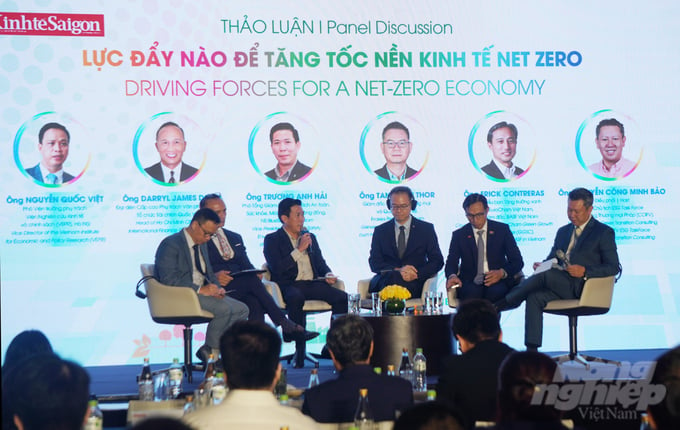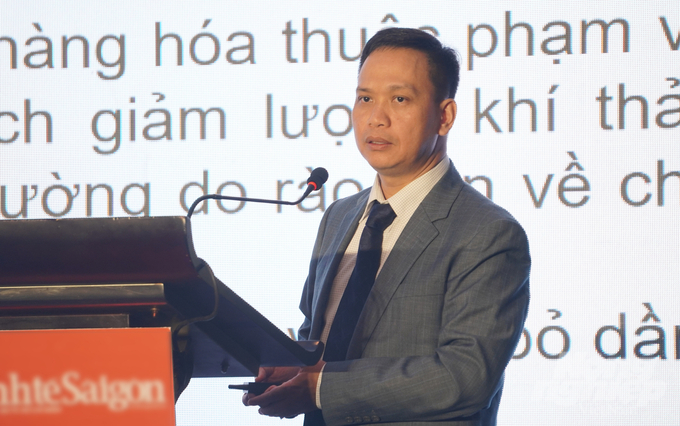November 20, 2025 | 13:15 GMT +7
November 20, 2025 | 13:15 GMT +7
Hotline: 0913.378.918
November 20, 2025 | 13:15 GMT +7
Hotline: 0913.378.918

The Urban Economics Journal organized the "Sustainable Development 2024" forum with the theme "Accelerating the Net Zero Economy" on September 19. Photo: Nguyen Thuy.
In addition to climate change, the degradation of natural resources, environmental pollution, economic damage, increased inequality, and social conflicts are becoming increasingly evident as consequences of unsustainable development.
If stakeholders fail to promptly address these issues, future generations will have to face increasingly severe consequences.
To meet the commitment of achieving net-zero carbon emissions by 2050, the Vietnamese government is implementing various measures and policies with a focus on reducing greenhouse gas emissions, promoting renewable energy, and protecting the environment.
These actions further emphasize Vietnam's strong commitment to combating climate change and achieving the Net Zero goal by 2050.
The Urban Economics Journal organized the "Sustainable Development 2024" forum with the theme "Accelerating the Net Zero Economy" on September 19. During the event, Dr. Nguyen Quoc Viet, Deputy Director of the Vietnam Institute for Economic and Policy Research (VEPR), reported that Vietnam has one of the highest CO2 emissions per GDP growth rates in Asia. In order to meet the Net Zero target by 2050, the government and business community must rapidly enhance their green transition efforts to reduce carbon emissions by approximately 78%.

Dr. Nguyen Quoc Viet, Deputy Director of the Vietnam Institute for Economic and Policy Research (VEPR). Photo: Nguyen Thuy.
Both the government and the business community must adopt new measures to accelerate the green transition process. Accordingly, the government and state agencies must improve the carbon reduction policy framework, establish regulations on carbon markets, carbon pricing, and green certification, and design and implement policies to support businesses in achieving green production.
Dr. Viet highlighted that Vietnamese exporters to Europe face significant challenges due to green policies that act as barriers to market access. Examples include the Farm to Fork Strategy, the Circular Economy Action Plan, and the EU Biodiversity Strategy for 2030.
Most notably, the Carbon Border Adjustment Mechanism (CBAM) significantly affects businesses exporting to the EU. "Without planning to reduce carbon emissions, businesses will struggle to compete and maintain their market position due to cost barriers and credibility issues. Policy directions and consumer preferences will increasingly favor green-listed products."
On the other hand, industrial businesses are in urgent need of solutions to promote energy efficiency, obtain "green certification," and demonstrate their emission reduction roadmaps. Additionally, they also require comprehensive ESG practices, which include social responsibility and environmental protection. Dr. Viet recommended that businesses adopt and practice ESG in a drastic and systematic manner.
He also noted that current ESG practices among domestic businesses are relatively ineffective and uncommon. The majority of Vietnamese companies are relatively inexperienced in ESG practices, with many lacking awareness and understanding of this concept.
"Many businesses, especially small and medium-sized enterprises, may not fully understand the Net Zero concept and related requirements, which can result in ineffective implementation and failure to meet set goals," Dr. Viet explained.
Dr. Viet emphasized the need to foster a shift in both business and consumer awareness regarding ESG practices. Additionally, businesses should proactively research green transition policies, regularly update information and knowledge on related green policies, and take early action to enhance capital, technology, technical, and management capabilities, with a focus on the implementation of ESG practices.
Furthermore, stakeholders must coordinate their policies and regulations in order to address the issues in a comprehensive manner, with the aim of achieving the Net Zero target by 2050.
ESG is gradually becoming a standard metric for evaluating the sustainability of businesses, with its key components being 'environment, social, and governance.'
However, ESG standards are a relatively new concept to the Vietnamese business community. Green energy, green production, and green growth are critical factors in improving ESG scores and enhancing competitiveness in the export sector. ESG adoption is becoming a prevailing trend among businesses around the world.
More companies are actively working to reduce carbon emissions and waste and to use socially responsible inputs, as ESG criteria gain importance among investors and consumers.
Green products are defined by four criteria: they must be made from environmentally friendly materials; provide safer alternatives to harmful products; reduce environmental impact during use (e.g., minimal waste, use of renewable energy, lower maintenance costs); and create a safe and friendly environment for health.
Translated by Nguyen Hai Long

(VAN) The United Kingdom (UK) has offered to assist Vietnam in accessing significant financial resources to drive agricultural innovation while simultaneously expanding the market for forest-based carbon credits.

(VAN) Luxembourg is developing a new climate finance strategy, with Viet Nam identified as a key partner, particularly in strengthening urban climate resilience.

(VAN) On November 19, the Agriculture and Environment Magazine held a workshop on regional linkages to advance green value chains in Viet Nam’s agriculture.

(VAN) 150 young delegates had the opportunity to meet and share initiatives aimed at enhancing knowledge and skills, working toward a climate-resilient and sustainably developed ASEAN.

(VAN) At COP30, Viet Nam emphasized that international decisions must be grounded in fairness, taking into account the capacities and needs of developing countries.

(VAN) Located downstream of the Ba Lai River, Vam Ho Bird Sanctuary is home to hundreds of birds and rare wildlife, preserving the ecological balance of a riverine region.

(VAN) Over two days of operations, Region 1 forest rangers dismantled nearly 10,000 meters of nylon nets and released dozens of trapped wild birds.